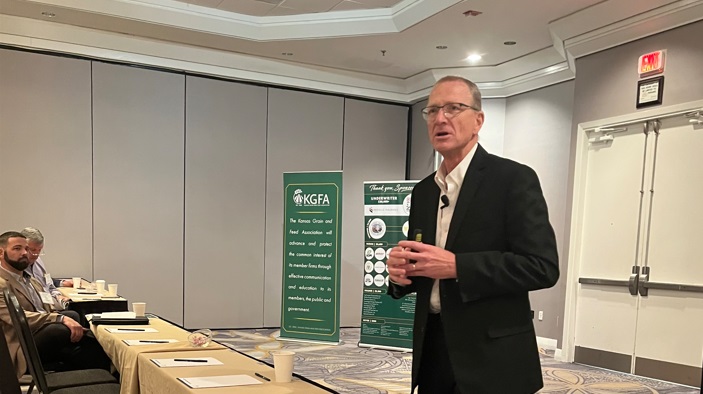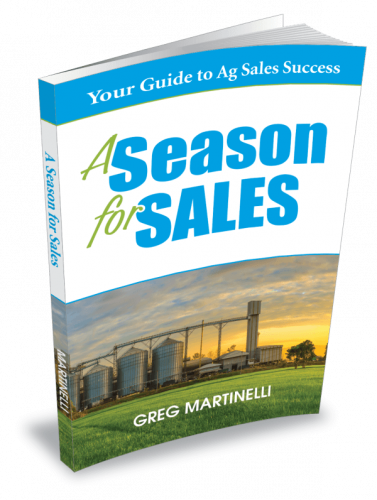How to differentiate from competitors and increase your selling success
One of my favorite training points with any audience is on the subject of differentiation.
It should be the first step in your sales career because it completes the most important phrase in your vocabulary:
“Customers hire me to _________ when they want (because) ___________.”
Most salespeople try to do this through their products or through something their company does. When completing this phrase, they will start talking about their technology or maybe how long their company has been in business. Often, they completely overlook the importance of what they offer as a salesperson.
The problem with relying on building better products or promoting your company is that a new and better product can be developed by competition. They may undercut your prices. Your company might discontinue making the product or offering the service that you focused on to get your sale.
However, in all cases, there is only one you! There is only one person with your skills, your experience, and your resources in the world. The only way to get your selling skills, your industry knowledge, and your undying customer service is to buy from you.
Most new salespeople get hired and then go out into the marketplace to see what their competition is doing. Then, they emulate or copy those tactics. Maybe they try harder at those tactics or they might charge less than the competition in an attempt to buy their way into the business. Any of these strategies make you look like every other salesperson out there.
The secret to selling is differentiation. Said another way, “The Gold is in your Gift”. Stop trying to be better at what others are doing and focus on developing your gifts. Here are some thoughts and questions on how.
- Expand on your strengths: It is really important that you understand the concept of selling based on your strengths versus being everything to everyone. To explain this point, I like to ask audiences who their favorite comedian is. Robin Williams is a popular response. One of my senior friends might throw out the name Don Rickles or Jack Benny. So, I ask them, “Does anyone care that Robin Williams was terrible at mowing his lawn or changing his oil?” As they give me puzzled looks, I explain that we loved Robin because of his crazy and wild humor. We couldn’t wait to see the explosive improv that he could accomplish. In other words, we watched him (hired him) for his strength.
Your customers are no different. They hire you for your strengths. They hire you for who you are: not for who you are not.
Please don’t misinterpret this to mean you can forget about your weaknesses. In Cliffton Strength Finders training, we learn how to manage our weaknesses. We sell on strengths and mitigate our weaknesses. To mitigate them, we can get others to do them for us as I’m sure in the case of Robin mowing his lawn. We can also continue to improve upon critical weaknesses but sell on our strengths.
For example, technical knowledge is often a critical weakness for a young salesperson. Everyone in agribusiness is trying to be the most technically competent salesperson in the market. Nothing wrong with that, but hard to compete if you are new and lack experience.
Here are some thoughts to keep in mind regarding technical knowledge:
- Everyone starts on day one.
- Everyone has a certain level of expertise. Someone is always going to have more and someone will always have less than you.
- Nobody knows everything.
- Just be on a continuous learning journey about the technical aspects of your business.
- Never stop asking questions. With a basic knowledge of the industry, you should be able to ask good questions to learn from everyone you meet.
- Never underestimate the power of going farm to farm, dealer to dealer, agribusiness to agribusiness all day long, every day. It doesn’t take long for you to get fairly technical on most products.
- What resources in the industry can you connect with to bring to your customers? Who or where is the Center of Excellence?
2. Soul-searching questions for every salesperson to discover and develop your gifts:
- What experience in your background can you expound on to help set you apart?
- How are you different?
- What do you know, do, or believe that is different than others?
- What resources do you have access to within yourself, your company, or your vendors?
After answering these questions, then ask:
- How does your customer achieve value from your answers? Remember, value is in time, dollars, or emotion.
- Do your customers care about that value? Will they actually pay for it?
- If yes, then what is the impact on them in value?
- If not, then either quit selling on that strength or find the niche of customers that do value it.
- Do your customers care about that value? Will they actually pay for it?
The answers and consolidated information you get from these questions begin to form who you are and what it means to do business with you.
Ultimately, this becomes your personal brand. And like it or not, your customer owns your brand. You can certainly do much to influence it, but your customer makes up their mind as to what your brand is in their mind.
Work on it today and every day after!
I mention to all my audiences that I do what I preach. I never want someone to think I’m recommending or talking about selling skills that I did 20 years ago and don’t implement them in my own business. Just like you, I get up and sell every day. I have to differentiate my products, services, and my brand just like you do. My customers have choices and need to clearly understand why they should do business with me.
So here is my answer to the phrase.
Customers hire me to develop their sales team when they are looking for a customized program by someone who is experienced and focused on agribusiness.
There is a lot of details behind those two factors. And I go further into the details, which gives me the right to say it or sell on it.
One quick aspect that comes up often is for experienced or tough crowds. Many on our Ag sales teams have been selling for a long time and can be resistant to sales training. Often, companies hired a trainer that didn’t know Ag or was fairly young. The older salespeople on the team were not open to working with that type of trainer. Being older and once being in their shoes, I can connect with a wide range of experience levels.
Retention and Implementation:
One more focus of my differentiation: The two jobs I have when working with your team are being memorable and getting implementation. A trainer only works with your team for a moment in time. Content can be easily forgotten. So, I focus on retention aspects. The best training that is forgotten can’t be implemented. Secondly, they have to actually implement it. So, again, I focus on implementation strategies that work at the speed of life.
Again, there are a multitude of sales training programs out there. And many are good programs. But you only get someone who has 30 years of selling and developing Ag salespeople by working with me.


